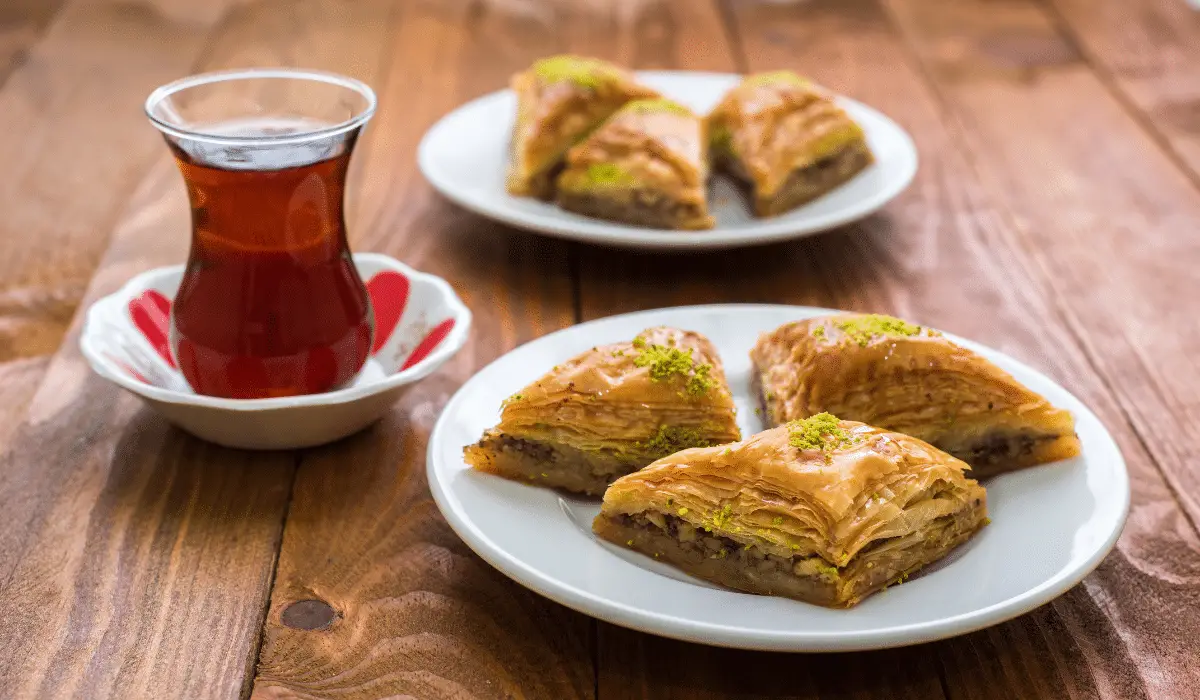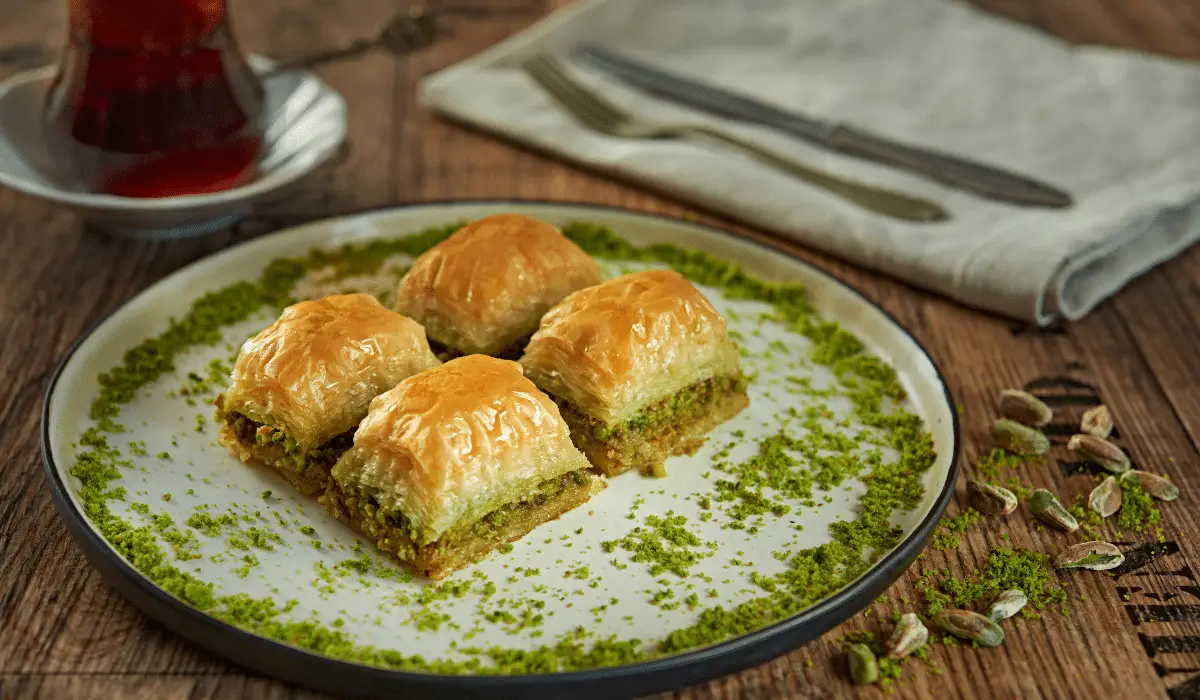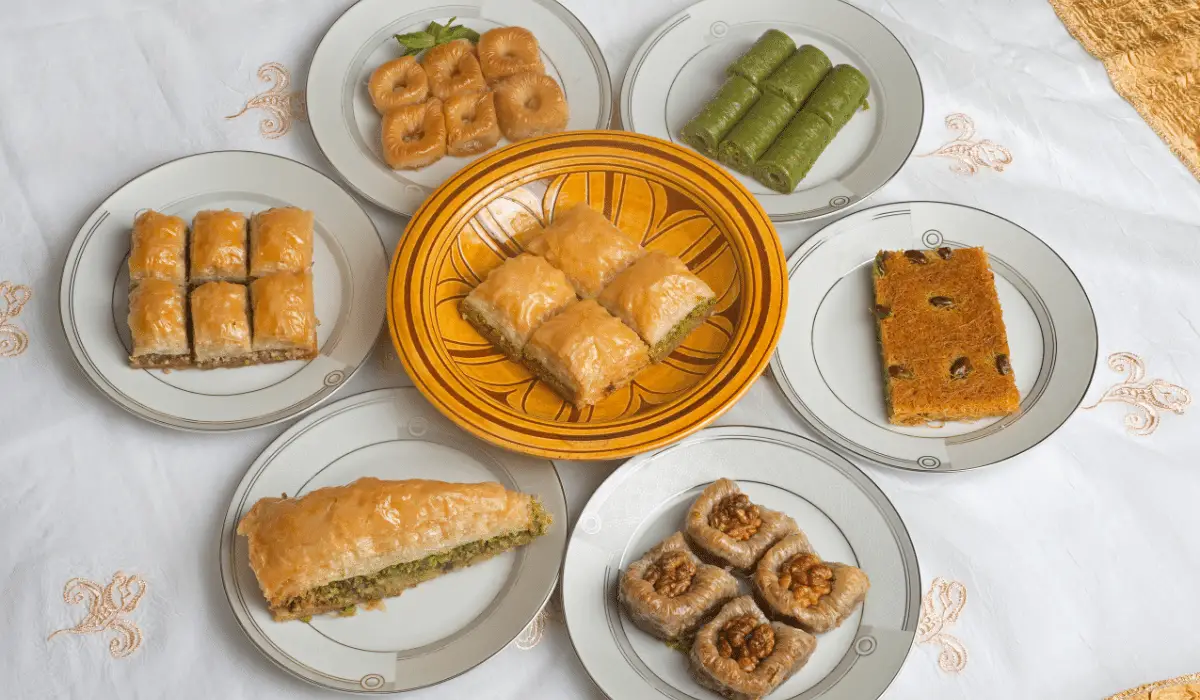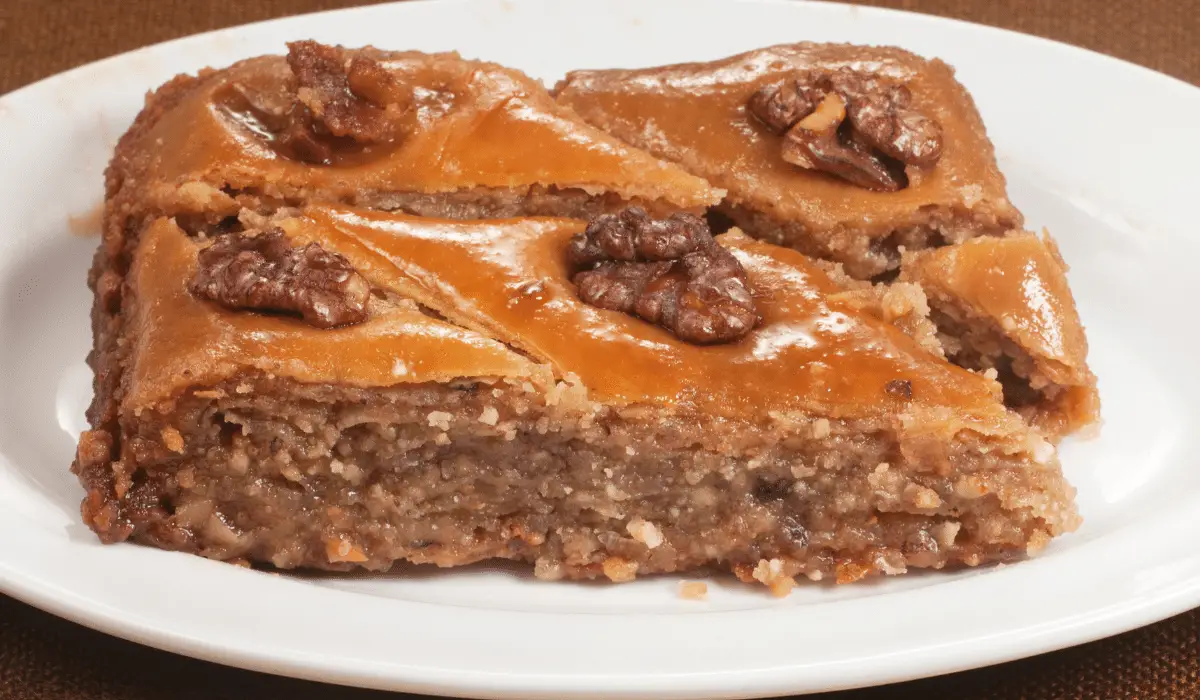Introduction to Baklava: A Sweet Delight
Baklava, a timeless pastry, mesmerizes with its sweet, nutty layers, encased in flaky phyllo dough. Originating from the Middle East, this dessert has journeyed across continents, gaining popularity everywhere. Now, a pressing question arises for baklava enthusiasts: “How long does baklava last?”
Firstly, let’s delve into what makes baklava so unique. Its intricate layers, often filled with nuts like walnuts or pistachios, are generously soaked in honey or syrup. This combination not only creates a delectable taste but also plays a vital role in its shelf life. The sweet syrup acts as a natural preservative, extending the dessert’s freshness.
However, freshness doesn’t last forever. Several factors influence how long baklava retains its optimal taste and texture. These include the ingredients used, the method of preparation, and most importantly, the storage conditions. Typically, baklava can remain fresh for about one to two weeks when stored properly at room temperature. In the refrigerator, its life extends slightly longer.
Moreover, the debate between homemade and store-bought baklava also impacts its longevity. Homemade baklava, free from preservatives, often has a shorter shelf life compared to its commercially made counterpart. This difference highlights the importance of understanding and adhering to proper storage techniques.
In conclusion, the longevity of baklava depends on various factors. While it offers a delightful experience, knowing how to preserve its freshness ensures that each bite remains as enchanting as the first. So, the next time you indulge in this sweet delight, remember, its enduring appeal lies not just in its taste, but also in how well we preserve its essence.
Understanding Baklava’s Shelf Life
The Lifespan of a Sweet Delight: Baklava
Baklava, a layered pastry delight, brims with nuts and sweetness. A common question among enthusiasts is, “How long does baklava last?” This question deserves a straightforward answer, as the shelf life of baklava varies based on several factors.
Key Factors Affecting Baklava’s Freshness
Firstly, the ingredients play a crucial role. The quality and type of nuts, honey, and phyllo dough directly impact how long the baklava remains fresh. Additionally, the environment where you store baklava greatly influences its lifespan.
Homemade vs. Store-Bought: A Shelf Life Comparison
Interestingly, homemade baklava often outlasts store-bought varieties. Why? It’s all about the absence of preservatives in homemade versions, which, ironically, can shorten the shelf life.
Optimal Storage: Prolonging Freshness
Now, let’s talk storage. Keeping baklava in an airtight container, away from direct sunlight and at a stable temperature, is key. These simple steps can significantly extend its freshness.
Concluding Thoughts: Savoring Each Bite
In conclusion, while the answer to “How long does baklava last?” is not one-size-fits-all, proper care and storage can ensure you enjoy this sweet treat at its best for as long as possible.
Ingredients Impacting Baklava’s Freshness
Freshness Factors in Baklava Ingredients
Wondering how long baklava lasts? The answer largely hinges on its ingredients. Each element in this delectable dessert influences its freshness and shelf life.
Key Ingredients and Their Roles
- Nuts: Baklava’s heart lies in its nuts. Almonds, pistachios, or walnuts, commonly used, contain oils that affect baklava’s freshness. As these oils age, they can turn rancid, impacting the pastry’s taste and longevity.
- Syrup or Honey: The sweet glaze of syrup or honey not only adds flavor but also acts as a natural preservative. This sugary coating helps retain moisture, extending baklava’s life.
- Phyllo Dough: The crispy layers of phyllo dough are prone to moisture loss. Once it dries out, the baklava loses its appealing texture. Proper storage is key to maintaining the dough’s delicate crispness.
Storage: A Crucial Consideration
How you store baklava significantly affects its shelf life. Keeping it in an airtight container, away from direct sunlight and heat, helps preserve its ingredients’ freshness. Refrigeration can extend its life, but beware of moisture build-up, which can lead to sogginess.
Conclusion: Savoring Baklava at Its Best
Understanding these ingredient dynamics answers the question, “How long does baklava last?” With the right care, you can enjoy this delightful treat in its freshest form, savoring each sweet, crispy bite.
Homemade vs. Store-Bought Baklava: A Freshness Face-Off
When it comes to the key question, “How long does baklava last?” the battle between homemade and store-bought varieties is crucial. Let’s dive in.
Freshness and Flavor: The Homemade Advantage
Firstly, homemade baklava often triumphs in freshness. Crafted without preservatives, its shelf life might seem shorter, but this means you’re enjoying a more authentic, flavorful experience. Typically, homemade baklava stays fresh for about a week when stored correctly.
The Store-Bought Convenience Factor
Conversely, store-bought baklava offers convenience and a longer shelf life, thanks to preservatives. These additives extend its lifespan, sometimes allowing it to remain fresh for several weeks. However, this extended duration can sometimes compromise the classic, rich flavors that baklava enthusiasts cherish.
Storage and Quality: A Critical Comparison
How you store baklava significantly impacts how long it lasts. Homemade baklava, free from additives, requires careful storage, preferably in a cool, dry place. In contrast, store-bought varieties, with their preservatives, are more forgiving if storage conditions aren’t ideal.
The Final Verdict
In conclusion, if you’re pondering, “How long does baklava last?” remember this: homemade baklava offers an unparalleled fresh taste but with a shorter shelf life. Store-bought baklava, on the other hand, wins in longevity but may sacrifice some authentic flavors. The choice depends on your preferences for convenience versus a traditional taste experience.
Nutritional Insights: Baklava
Baklava’s Composition: A Caloric Delight
“How long does baklava last?” often leads to another pertinent question: What’s in it nutritionally? Baklava, known for its rich taste, contains a mix of nuts, sweet syrup, and buttery layers of dough, making it a high-calorie treat.
Breaking Down the Calories and Nutrients
A single piece of baklava packs a substantial calorie punch, primarily due to its sugar and fat content. The nuts, such as walnuts or pistachios, contribute healthy fats and a bit of protein. Yet, it’s the sugar and butter that significantly increase the calorie count.
Sugars and Carbohydrates: The Sweet Side
Baklava’s sweetness comes at a cost – high sugar levels. This dessert is rich in carbohydrates, mainly from sugar and refined flour, offering a quick energy boost but little nutritional value.
Moderation is Key
So, while you might wonder, “How long does baklava last?” remember that its nutritional profile calls for moderate consumption. Enjoying baklava as an occasional treat rather than a daily indulgence is a wise choice for balancing pleasure with health.
Baklava Varieties and Their Shelf Life
Exploring Different Baklava Types
When it comes to baklava, variety is the spice of life. But have you ever wondered, “How long does baklava last?” especially considering the different types available? Let’s dive into the world of baklava varieties and understand how each type impacts its shelf life.
Classic Walnut Baklava
Firstly, there’s the classic walnut baklava. Packed with rich, nutty flavors, this traditional type usually lasts up to two weeks when stored properly. The key lies in the walnut’s natural oils, which help preserve the pastry. For more detailed caring instructions, check out “Baklava Caring Instructions”.
Pistachio Baklava: A Longer-Lasting Delight
Next, consider the pistachio baklava. This variant, celebrated for its unique taste, tends to last a bit longer than the walnut version. Thanks to pistachios’ lower oil content, this type can stay fresh for up to three weeks.
Exotic Varieties: A Shorter Shelf Life
Now, let’s talk about exotic baklava varieties that include ingredients like cream or chocolate. These delightful twists add a burst of flavor but often shorten the shelf life. Typically, these versions remain fresh for about a week.
Storage: The Key to Longevity
Regardless of the type, proper storage plays a crucial role. An airtight container in a cool, dry place works best. For those exotic types, refrigeration is advisable to extend freshness. Additionally, freezing baklava can be an effective method to prolong its shelf life. Learn the best ways to store baklava in the freezer from this comprehensive guide: “How To Store Baklava In Freezer”.
Conclusion: Enjoying Every Bite
In summary, while exploring “How long does baklava last?” remember that each variety offers a unique shelf life. By understanding these differences and practicing good storage habits, you can relish every flavorful layer of your favorite baklava type.
Traditional vs. Modern Baklava: Impact on Longevity
When considering “How long does baklava last?”, it’s important to compare traditional and modern variants. The difference in ingredients and preparation methods plays a key role in their shelf life.
Traditional Treat: Time-Honored Ingredients
Traditional versions, rich in nuts, butter, and honey, boast a notable shelf life. These ingredients naturally preserve the sweet, allowing it to stay fresh and flavorful for about one to two weeks at room temperature. The longevity secret lies in honey’s natural preservatives and the low moisture in the nuts.
Modern Twists: A Fresh Perspective
Contemporary takes on this classic dessert often incorporate chocolate and fruits, influencing their lifespan. Varieties with fruit have a shorter shelf life due to increased moisture. Generally, these updated versions are best kept refrigerated, staying fresh for about a week.
Storage Tips for Enthusiasts
Proper storage is key, regardless of the style. Using an airtight container helps maintain texture and taste. For those with perishable ingredients, refrigeration can help extend freshness.
Conclusion: Tradition Meets Innovation
In conclusion, both traditional and contemporary styles can offer delightful experiences. The answer to “How long does baklava last?” depends on ingredient choices and storage techniques. Whether you’re a fan of classic recipes or new flavors, careful handling ensures your treat remains delicious.
FAQs About Baklava’s Shelf Life
What Affects Baklava’s Freshness?
The key question, “How long does baklava last?” hinges on several factors. Primarily, ingredients and storage conditions play pivotal roles. Fresh, high-quality nuts and proper sealing are crucial for longevity.
Room Temperature: How Long is Too Long?
At room temperature, baklava stays fresh for about 1 week. Beyond this, you risk dryness and spoilage. Always store it in a cool, dry place to maximize its shelf life.
Refrigerating Baklava: Does it Help?
Indeed, refrigeration can extend baklava’s life. In a fridge, it stays good for up to 2 weeks. Remember, airtight storage is key to prevent moisture and other flavors from seeping in.
Can Freezing Prolong Freshness?
Freezing baklava can stretch its life to 3 months. This method is ideal for long-term storage but be wary of texture changes upon thawing.
Spotting Spoilage: What to Look For?
Look out for mold, off smells, or a significant change in texture. These signs indicate your baklava has passed its prime and should not be consumed.




1 thought on “How long does baklava last?”
Comments are closed.